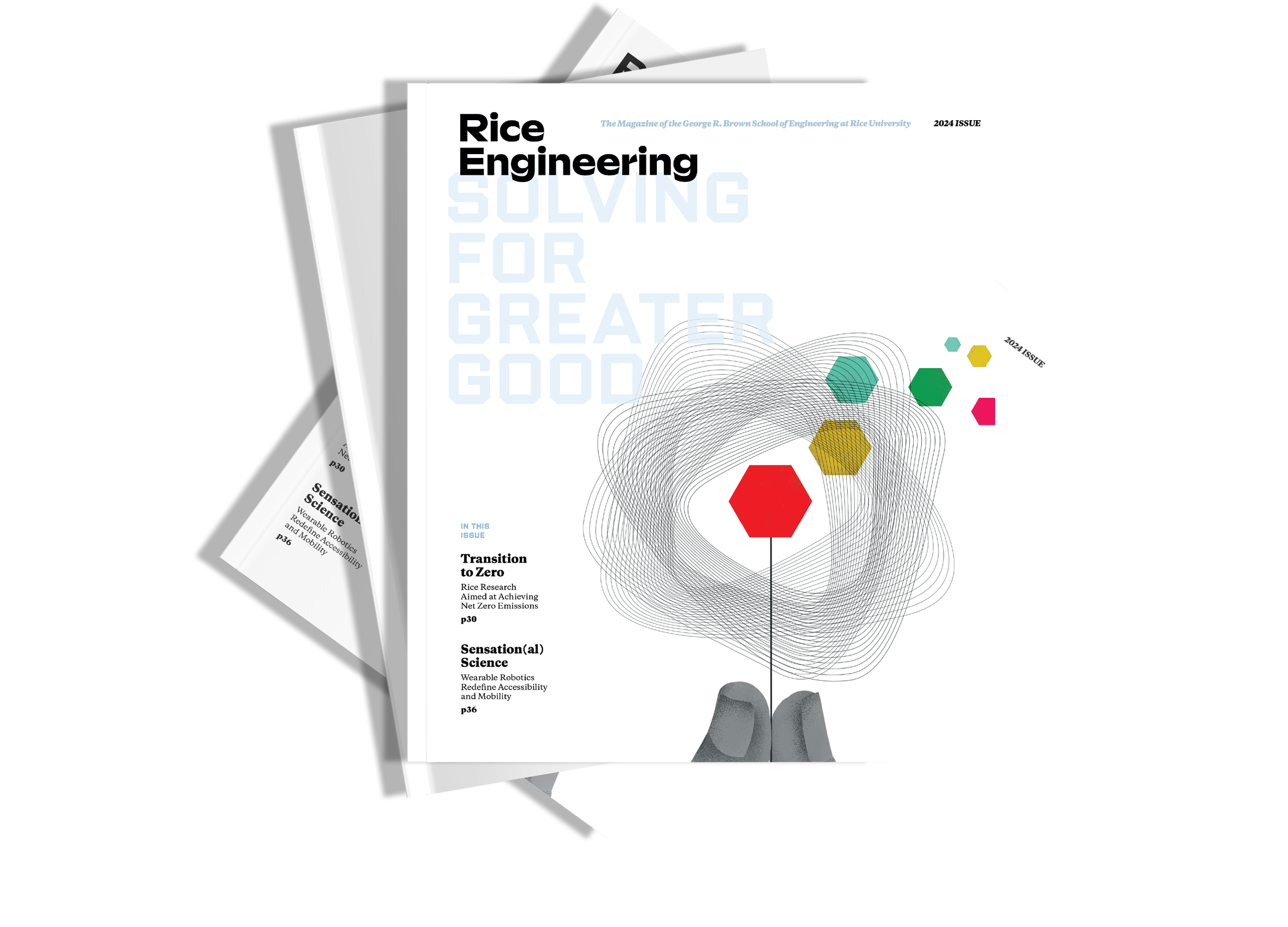
The spring 2024 issue of Rice Engineering Magazine is here!
At Rice Engineering, we are driven by a passion for innovation and a commitment to responsible engineering practices. It’s with great excitement that we unveil the new design of Rice Engineering magazine, which underscores our dedication to excellence in research, education, and service. The 2023-24 issue is full of news about how Rice Engineering is solving for greater good.
5 Questions for Lane Martin

What inspired you to pursue a career in materials science and nanoengineering?
I grew up in rural Pennsylvania and there wasn’t much information about different types of engineering readily available. I liked chemistry and math but figured chemistry might be too “fundamental.” I thought being a chemical engineer seemed a good balance. At Carnegie Mellon, I realized chemical engineering wasn’t what I thought it was. After a hard look at myself and conversations with advisers and the chair of the materials science department, it became clear that I was a materials scientist. I took the introductory course and started research in the spring of my freshman year.
Rice is the birthplace of nanotechnology, thanks to the late Richard Smalley and Robert Curl. When did you become aware of their Nobel Prize-winning achievements and how does it feel to be working at the site of their discoveries?
I was in high school when Smalley and Curl won their Nobel Prize. I didn’t know it but the timing was important for my career. When I was an undergraduate and graduate student, the impact of their work was being felt nationally. Nanoscience and nanotechnology were all the rage and much of the research we were doing reflected this new discipline. Smalley’s efforts to grow the national research effort in nanoscience and nanotechnology directly impacted me as I was an NSF Integrative Graduate Education and Research Traineeship Fellow in Nanoscience and Engineering.
Could you give readers an overview of your research in materials science and nanoengineering? What are some of the key questions or challenges you are addressing in your work?
My research focuses on advancing our ability to devise a new generation of electronic and functional materials. Think of the things you dream your cellphone or computer could do. We explore the materials that could enable those applications. We create very thin versions of materials, from a few atomic layers thick to a few hundred nanometers. We create exquisitely controlled nanoscale versions of these materials and coax new properties from them. Our work ranges from designing materials to enable ultra-low-power computing, to high-performance sensors and actuators, to energy conversion and storage.
What are your goals for your role at Rice Engineering and for your students? How do you envision mentoring and educating the next generation of materials scientists and nanoengineers?
My goal with students is to do a few important things. We want to develop new materials that improve life and solve societal challenges, and enable a new generation of technologies to further improve our lives. We want to enable students to be the best version of themselves and get outside their comfort zones.
How do you manage the challenge of balancing research, teaching and administrative roles at Rice?
Maybe not as well as I could! Being a faculty member is a rewarding job, one that keeps you intellectually agile. You are pulled in many directions every day so being organized is key. I’m a “list guy.” I love a good list that is curated and followed, updated and adjusted. There is something satisfying about finishing a task and checking it off. I try to break my days into little chunks. Before you know it, you’ve accomplished something.
Extra Credit
Finish this statement: "Rice Engineering is..."
Rice Engineering is about possibility. Rice enables some of the best students and researchers in the world to dream big. It gives them the support — in terms of education, infrastructure and facilities and human resources — to accomplish whatever they can imagine. We have new buildings, new campus initiatives in research, new faculty and research directions. It’s exciting to be part of the party as we build a cohort of the world’s best thinkers and doers.
